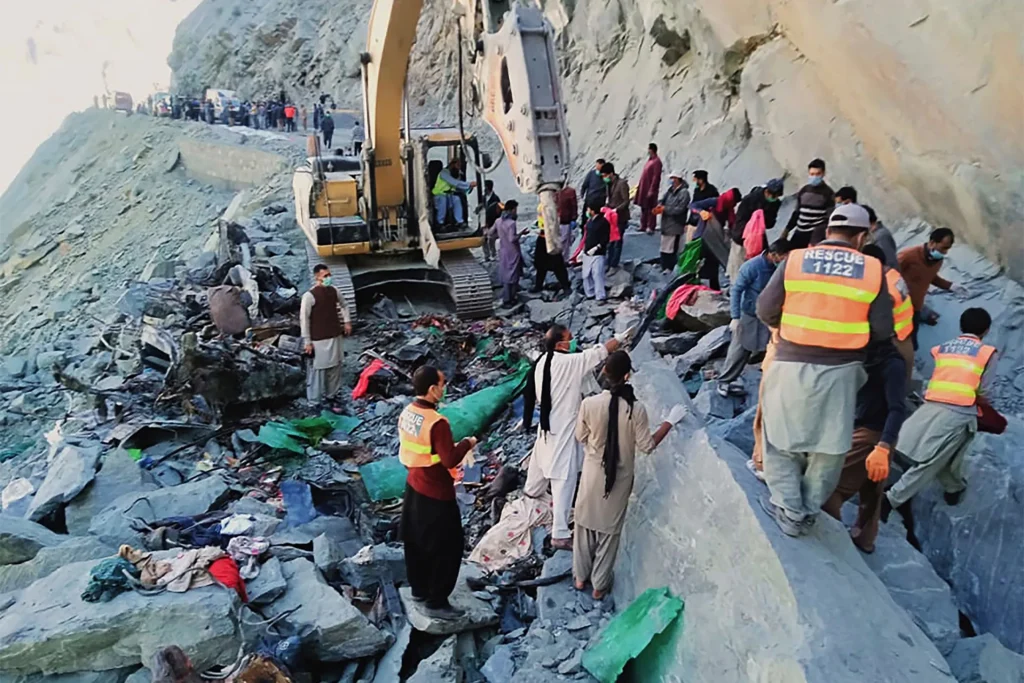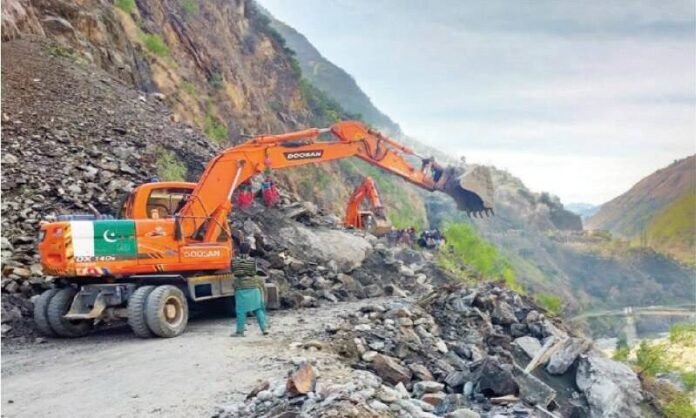GB CM Gulbar Khan mourns loss, orders aid for families and free treatment for injured as monsoon devastation continues across Pakistan.
Gilgit — In a heartbreaking incident in the early hours of Monday, at least eight volunteers lost their lives and three others sustained injuries when a powerful landslide struck during emergency restoration work on the flood-damaged Danyor Nullah in Gilgit. The victims, all local residents, had been working through the night to repair a vital water channel destroyed by recent torrential rains, aiming to restore water supply to their community.
Deadly Landslide Strikes Without Warning
According to Gilgit-Baltistan government spokesperson Faizullah Firaq, the landslide occurred at around 2am, when approximately 15 volunteers were on-site, clearing debris and reconstructing sections of the damaged channel. Without any forewarning, tonnes of mud, rocks, and unstable earth gave way from the hillside above, engulfing the repair site and burying several workers under layers of debris.
Eyewitnesses described hearing a deafening rumble seconds before the slope collapsed. Rescue teams, supported by police personnel and dozens of local residents, rushed to the scene despite the darkness and challenging terrain. Four individuals were pulled from the rubble alive but in critical condition. They were immediately transported to nearby hospitals, where authorities declared an emergency to ensure immediate medical attention.
The rescue operation continued for hours, with volunteers and officials working side-by-side under floodlights to retrieve bodies and search for any potential survivors.
Victims Identified and Honoured
The deceased have been identified as Piyar Ali, Naik Alam, Adam Ali, Azharuddin, Afaq Azhar, Azhar, and Dildar Hussain. All were long-time residents of the area, known for their active roles in community work. Their bodies were recovered and handed over to their families after mass funeral prayers were offered in Danyor, attended by hundreds of mourners who came to pay their respects.
Local elders spoke of the bravery and dedication of the victims, many of whom had been volunteering tirelessly for weeks in flood relief efforts.
Chief Minister’s Tribute and Relief Measures
Gilgit-Baltistan Chief Minister Haji Gulbar Khan expressed profound sorrow over the tragedy, describing the volunteers as “heroes who sacrificed their lives for their community’s survival and dignity.”
He announced immediate financial compensation for the bereaved families and directed that all medical expenses for the injured be covered by the government. “These brave men were working selflessly to restore life-sustaining infrastructure. Their sacrifice will be remembered as an example of community solidarity in the face of disaster,” Khan said.
The CM also instructed relevant departments to intensify relief and rescue operations in the region, warning that further landslides were possible due to ongoing heavy rainfall.
Monsoon’s Relentless Toll on Gilgit-Baltistan
This latest disaster adds to the mounting toll of Pakistan’s ongoing monsoon season, which has unleashed weeks of destructive rains, flash floods, and landslides. Nationwide, more than 260 people have lost their lives, while thousands have been displaced from their homes.
Gilgit-Baltistan has emerged as one of the worst-hit regions. Just last month, CM Gulbar Khan reported that torrential rains had claimed 10 lives and injured four others in the area. The extreme weather has also destroyed over 300 houses and caused extensive damage to essential infrastructure. Officials estimate that 30–40% of water channels in the region have been destroyed, along with up to 20 kilometres of roads, severely disrupting transportation and access to remote communities.
Local authorities are warning that with heavy rainfall forecast to continue, the risk of further landslides, flash floods, and infrastructure collapse remains high — particularly in mountainous areas where unstable slopes have been saturated by weeks of rain.
A Region on the Frontline of Climate Challenges
Experts point out that Gilgit-Baltistan’s vulnerability to such disasters is heightened by its geography and changing climate patterns. Situated in the mountainous north, the region experiences intense monsoon rainfall and rapid glacial melt, both of which increase the likelihood of floods and landslides. Limited infrastructure and the remoteness of many settlements make emergency response efforts more challenging and dangerous.
Local communities, however, have continued to respond with resilience, often stepping in to assist with rescue and rebuilding efforts when official resources are stretched thin — as was tragically the case in Danyor.






















